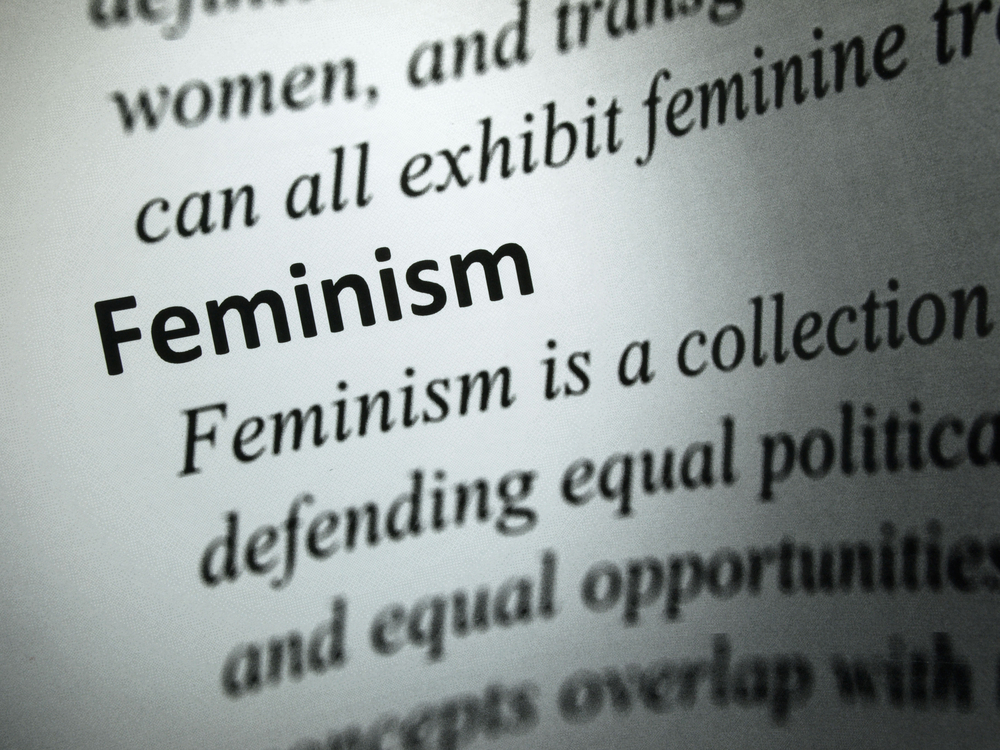
Photo via Shutterstock
I have written before about my struggles with the term feminist. To recap basically it’s this; in my twenties I would have clearly defined myself as a feminist; in my thirties I would still have regarded myself as a feminist but was beginning to feel that traditional feminists wouldn’t describe me as such given that I gave up that decade to being at home with my kids; now in my forties I struggle to identify with the label, and that is a regretful thing for me.
Why did I lose my attachment to the term feminist? A variety of reasons, but here’s two of them.
The Label Itself
The feminist label seems to have become problematic there so much time devoted to forcing women to embrace the label (and then so much attention given to whether they are the right kind of feminist) that I became deeply frustrated with the whole bloody process. In one sense the badgering of young women to declare themselves as a feminist created a dramatic backlash. They were moved from apathy to activism alright but it was activism against feminism itself – and of course there’s a hashtag for it #womenagainstfeminism. Women hold up signs declaring why they are not feminists.
I don’t need feminism because I made my own choice to be a stay at home mother and my working husband should not be harassed.
I don’t need feminism B/C men are not our enemy. They are our fathers, sons and brothers. Belittling them helps no-one.
I don’t need feminism because I don’t want my daughters growing up around slutty feminists.
Then it just got completely depressing and I had to step away.
Today the Foreign Minister, Julie Bishop has just given a speech at the National Press Club where, on feminism, she declared,
It’s not a term that I find particularly useful these days. I recognise the role it’s played and the barriers and challenges overcome by the women’s movement. I don’t reject the term but it’s not a word I’d use to describe myself.”
Oh God please don’t let that start another round of hand wringing over successful women not championing the cause. How about we just give her respect for being the ONLY woman to get a guernsey in the Abbott Cabinet and take a clear look at the policies she’s promoted, her successes and her failures. Go hard as you like on what she has DONE in her role as Foreign Minister but PLEASE let’s not worry about what she wants to call herself.
The Lack of Inclusion
The feminist movement seems to devalue the contribution of stay-at-home mothers. There are very few posts dedicated to highlighting how a woman can grow and develop during her time-out years, very few looking at how a stay-at-home mother can impact on the world in her own small way by raising girls and boys believing in equality, hardly any looking at how a woman can have a circuitous staircase career rather than a linear one, and little advice for women on how to give themselves a secure financial future even while taking a break from work.
I think there is a lot to be learned from the stay-at-home mum experience and it has a value that is being ignored.
The growth of social media gives platforms to people who otherwise have had no voice. However, that power is lost when the discussion is dominated by those who speak the loudest and refuse to consider alternatives outside of their own beliefs or experiences.
As I highlighted in my review of The Wife Drought yesterday I firmly subscribe to the theory that we need to sort out the home front in conjunction with the workplace and we need to get men as involved in the caring responsibilities.
The stay-at-home years taught me my identity is not linked to a job. The experience saw me develop new skills and confidence.
I would love to hear stories of women who have reinvented themselves and their careers after their time-out.
So … feminist or not?
I don’t see my lack of identification with the term “feminist” as being a support of anti-feminism. I clearly believe in equality. I have the deepest respect for both the women who fought so hard for the benefits we have now, and the feminist of today who continue the battle. However, I am frustrated by the methods of communication and concerned the movement is so focused as to have lost the ability to consider alternatives to what has always been done.
The world is a different place in 2014, we can afford to be a little more creative and strategic in how we work towards equality.
What does the term feminist mean to you?





A very nice piece of writing. I feel very much like you. I’d love to write a small essay here but just don’t have the time or head space to do it right now. Suffice to say… nice writing. One of these days we’ll discuss this in person at our mutual friend Therese’s house when I’m up in your part of the world.
That would be absolutely lovely.
Thanks for another interesting episode in the series. I also called myself a feminist when younger and I guess I still think of myself as one to some extent, certainly in terms of equality & women’s rights, & recognising the impact of sexism on women’s lives, but these days I hesitate to define myself with too many labels.
I think that taking on a label and an identity can mean that you risk losing your integrity, because perhaps you don’t question, or you feel you have to automatically agree with and defend, every position associated with that label, even if there are opinions you may not support – like the notion that being a stay at home mum is less feminist than being in the workforce.
I’ve worked since my son was 9 months old, because financially I didn’t have any other choice and also because I had a great job that’s brought me many rewards – but having seen what a magnificent job my own stay at home mother did, it would be pretty churlish to reject that as a choice women shouldn’t be making.